Education | February 28, 2024
ASI Diversity Council Welcomes Artists and Craftspeople to Mark Black History Month
Employees had the opportunity to purchase handmade items, create works of art and taste delicious food, all thanks to local Black business owners.
*Writers Sami Marshak and Christopher Ruvo and ASI University Education Director Joe Haley also contributed to this report.
Almost 10 years ago, Arlene Felder made a decision that would change her life.
A government social worker by day, Felder would decompress from her demanding and often stressful job by doing what she loved: baking cookies. What started as a hobby for herself (and a way to enjoy sweet treats during her lunch breaks) soon became a business of its own.
“I brought in my Butterscotch Delight cookies, and co-workers asked about them,” says Felder. “I started sharing what I baked, and then I was getting business from people for their parties, showers and catered events.” Soon, she was baking large batches in her home kitchen – she called her business Glassy Brown Cookies, in a nod to her love of boldly printed eyeglasses frames.
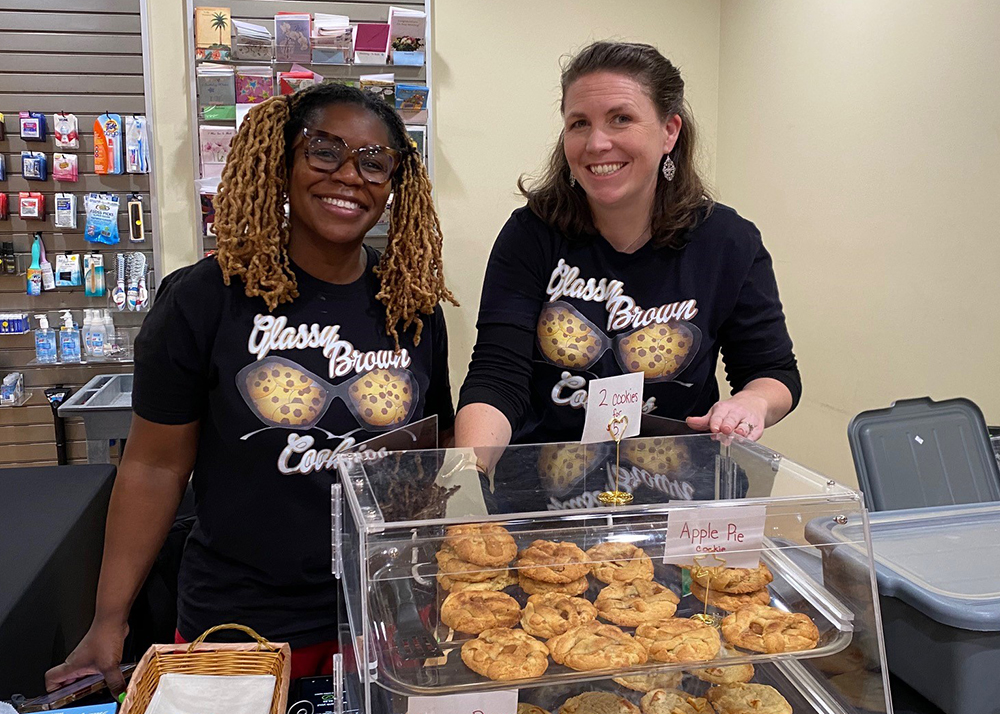
Arlene Felder and Lauren Kamp of Glassy Brown Cookies visited ASI with baked goods in tow.
ASI’s Diversity & Inclusion Council invited Felder, chef & CEO of Glassy Brown Cookies, and Store Manager Lauren Kamp to help kick off Black History Month celebrations by visiting ASI in early February with cookies for sale; flavors included Cinnamon Snickerdoodle, Banana Pudding, Apple Pie and Classic Chocolate Chip. The theme for the month’s events was support for Black-owned businesses and entrepreneurs in the local community.
Felder’s been baking since she was 5 – first with an Easy-Bake Oven, then with a full-sized oven to recreate her grandmother’s recipes. As demand increased about 10 years ago after colleagues realized her talent, Felder needed more room than her home kitchen could offer.
ASI University Education Director Joe Haley speaks with Arlene Felder about launching Glassy Brown Cookies.
So in 2015, she decided to open a Glassy Brown Cookies storefront in Burlington, NJ, and for four years she worked both of her jobs. In 2019, she went full-time with the cookie business and opened a second location in Moorestown Mall just a couple years later. In the meantime, she became increasingly well-known in the Philly area thanks to local creatives like Mister Mann Frisby and Patty Jackson at WDAS – Felder is now a permanent guest on the “Patty and the Millennials” podcast. She’s also involved with philanthropic efforts, like baking cookies for organizations such as COCO Life, which organizes baby showers for underprivileged mothers and people of color.
“Our Burlington location is set up like a café,” says Kamp. “We want people to feel welcome and loved on.”
ASI Staff Discover Their Inner Artists
Moneek Pines-Elliot jokes that she was born with a paintbrush in her hand and that her first scribble was actually a paint splash.
You can certainly believe it when you meet the Philadelphia-based artist/entrepreneur. Her passion for art wells up from her soul and brightens her smile as she discusses her preferred medium of painting.
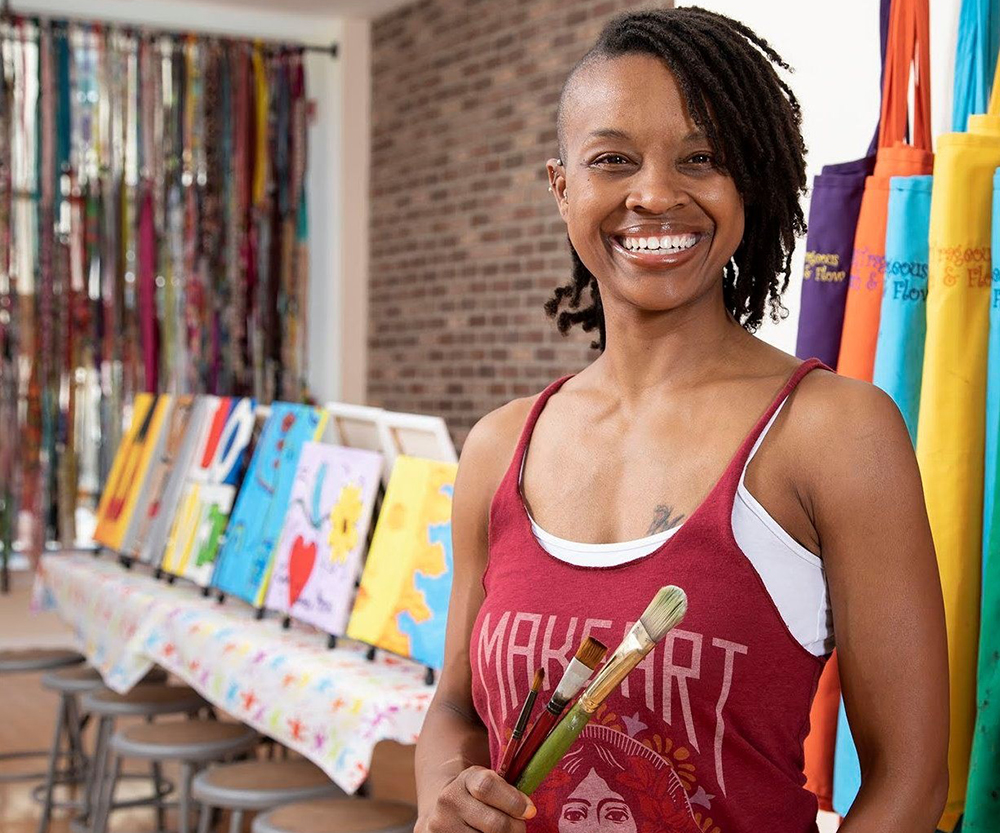
Artist/Entrepreneur Moneek Pines-Elliot
Almost as much as painting itself, Pines-Elliott loves helping others discover the joy of creating with color on canvas. It’s why she founded ARTrageous Brush & Flow, a Philly business through which she guides classes in the creation of a collaborative work of art.
As part of the Diversity Council’s celebration of Black History Month, Pines-Elliott led just such a session for ASI employees.
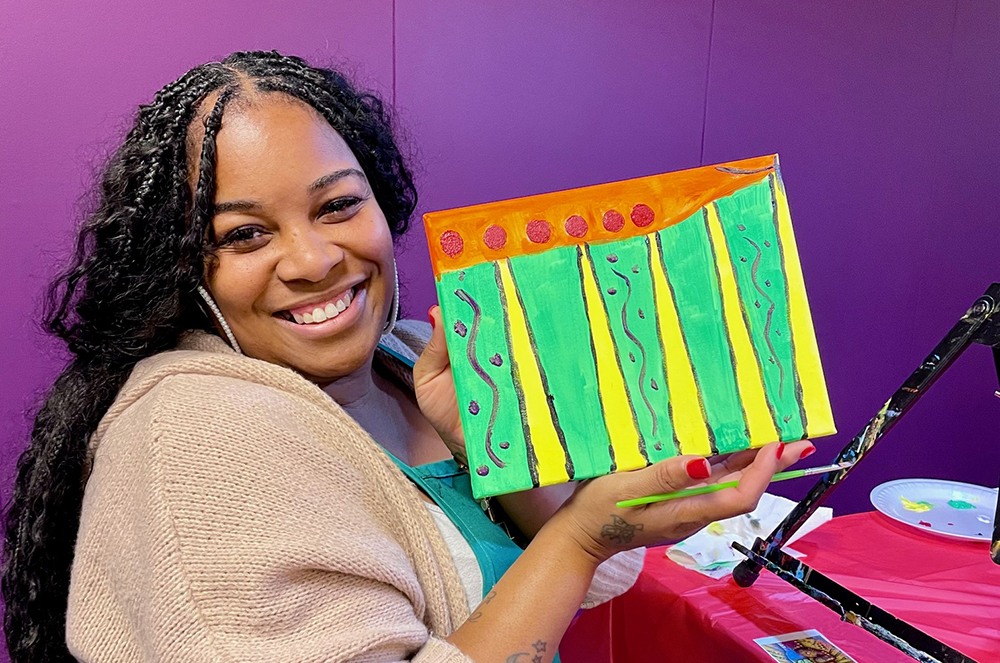
Brittany White was among the ASI employees who enjoyed letting the creative juices flow at the painting session.
“We’re all born artists,” Pines-Elliot told the group of 35 attendees. “It’s inside of you. We’re going to manifest that today.”
Hosted in ASI’s eclectic Purple Room, the vibe of the event was art house café. Music played lowkey in the background as employees sat several-to-a-table, painting on small individual canvases.
The canvases would be combined at the end of the class to form a single unified artwork. Still, employees were free to let their creativity flow within a few established lines needed to make the final work jump to life. Such an approach was well in keeping with Pines-Elliot’s aesthetic philosophy.
“I believe the best art is open-ended,” she said. “It’s not academic. It’s anything you want it to be. It’s a chance to be free and give voice to your inner child.”
In the end, Pines-Elliot and ASI staff fit the canvases together. What showed was a vibrant, color-bursting painting that depicted two fists bumping.

At the end of the class, each participant’s individual canvas was put together to create one painting.
Brittany White, a data editor in the EIT department, enjoyed Pines-Elliot’s embrace of open-endedness in art creation. White put that into practice.
“The colors just came out of me,” White said. “I was just freestyling. This was a great event. I don’t normally paint, but this was a chance to be creative.”
Camille Pride, assistant operations manager with ASI Show, expressed similar sentiments. “I had a really good time, just being able to get away from the day-to-day for a minute and to create something with colleagues,” Pride said.
ASI’s Diversity & Inclusion Council felt it was important to host an art-themed event as part of Black History Month celebrations. It was one small way of calling attention to the incalculable contributions of Black Americans to the rich history of American art across a wide variety of mediums.
Consider that essentially all forms of popular music in America today have their roots in African American culture. Modern fashion would be unrecognizable without the contributions of Black designers and trendsetters. In the world of painting, Black creatives like the revolutionary Basquiat – Pines-Elliot’s favorite – have shaken up and redefined the concept of fine art, inspiring generations of artists of all backgrounds.
“Art,” said Pines-Elliot, “is for everyone.”
Celebrating Authors and Artisans
In the second half of the month, ASI’s book club, facilitated by Becky Young, a senior front-end design developer for Creative Labs, met to discuss the first half of The Heaven & Earth Grocery Store. Published in 2023 by local author James McBride, the novel examines the history of the Chicken Hill neighborhood of Pottstown, PA, home to Black and Jewish residents, in the 1920s and 1930s. Attendees discussed their favorite characters and cultural themes in the book, including class and race relations.
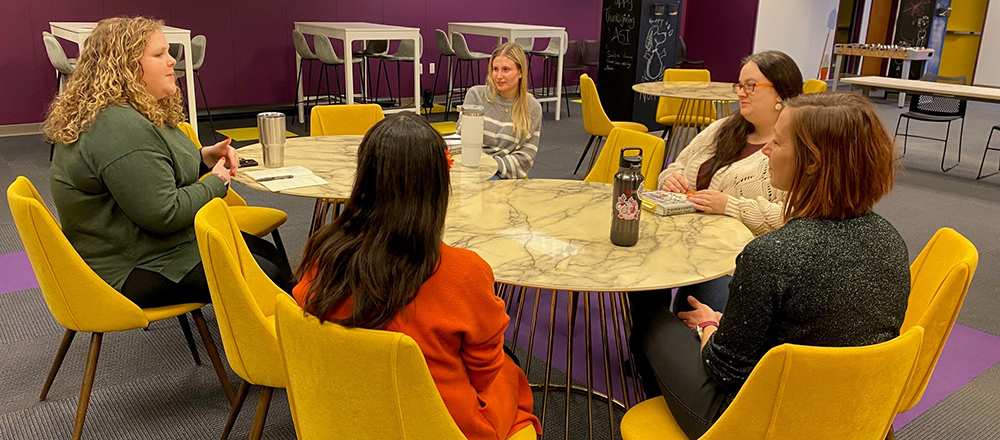
Employees discuss the first half of The Heaven & Earth Grocery Store.
“Books that touch on cultural issues give us a different perspective,” says Amanda Jablonowski, data coordinator & trainer for the ESP Information Team, who attended the meeting. “We all go through life with a variety of experiences rooted in our family and culture, and it’s worthwhile to learn about experiences that are different from our own. It helps us understand where other people come from and be more in tune with some of the ‘whys’ behind their thoughts and opinions.”
The Diversity & Inclusion Council also invited Marques Davis of Mount Airy Candle Co. to offer handpoured candles for sale – with scents like Figs & Pink Pepper, Grapefruit & Vetiver, and Golden Teakwood. Davis started making candles as holiday gifts about five years ago and quickly realized he had a knack for it.
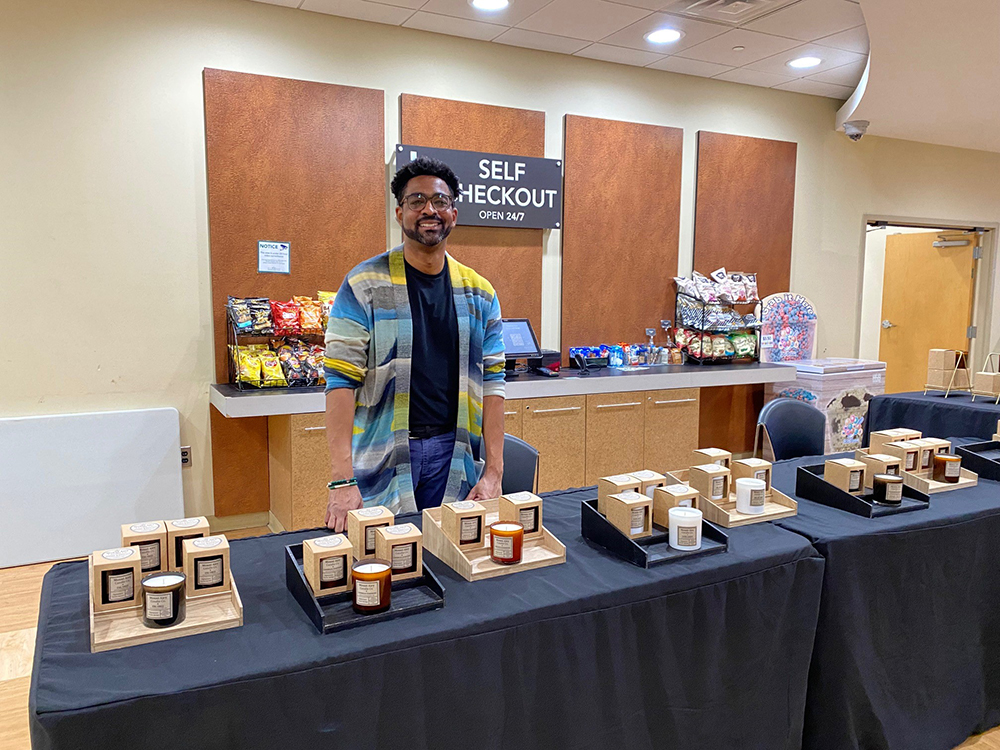
Marques Davis of Mount Airy Candle Co. visited ASI with a selection of handpoured candles made in Philly.
“I’ve always had a keen sense of smell,” he says. “It was kind of my superpower, and it led to this.” He started by sourcing supplies and ingredients from a company in Bucks County and watching instructional videos on YouTube. In April 2023, after about four years of making them in his house, he opened a retail lounge and studio in Philadelphia where he creates candles, perfumes and skin care products like body butter, oil and wash.
Joe Haley discusses small-business ownership with Marques Davis of Mount Airy Candle Co.
Now, Davis sources supplies and ingredients from several states and constantly works on new scents. “I’ve always liked scent notes, and I can use that ability to create custom commissioned candles for customers, including events and charities,” he says. “I usually incorporate those into my collection about a year later.”
Local restauranteur Allysha Holmes capped off the month with a special soul food tasting session for ASI employees. Nearly a decade ago, the chef turned terrible misfortune into a springboard from which she launched her life’s entrepreneurial and artistic purpose – she and her daughter were injured after being struck by a van while walking down a West Philadelphia sidewalk in 2015. They both survived, but the following years were dark and difficult.
Cooking became a way of interjecting light. Holmes took inspiration from her childhood, when her father, grandmother and other family members would create delicious dishes, and began putting her own unique twists on traditional soul food recipes.
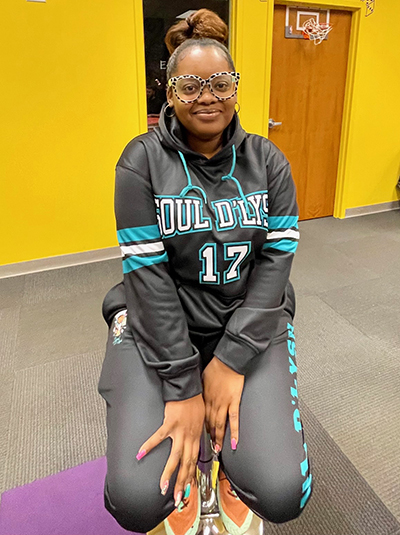
Allysha Holmes, Soul D’Lysh
From this creative experimentation and honest joy, Holmes’ food truck/catering business, Soul D’Lysh, was born. Holmes visited ASI in late February and cooked up a buffet of delectable cuisine for staff to enjoy onsite.
The event was a hit – a culinary journey into soul food and the artistic craft of a talented, hardworking chef.
“Cooking is an art, no different than music or painting,” Holmes said. “And it’s universal, a social staple. Everyone needs to eat. Food is something that brings everyone – no matter their race, ethnicity or background – together.”
Certainly, ASI employees were bonding as they dug into plates heaped with goodies like sweet potatoes, collard greens, baked mac & cheese, and fried chicken wings.
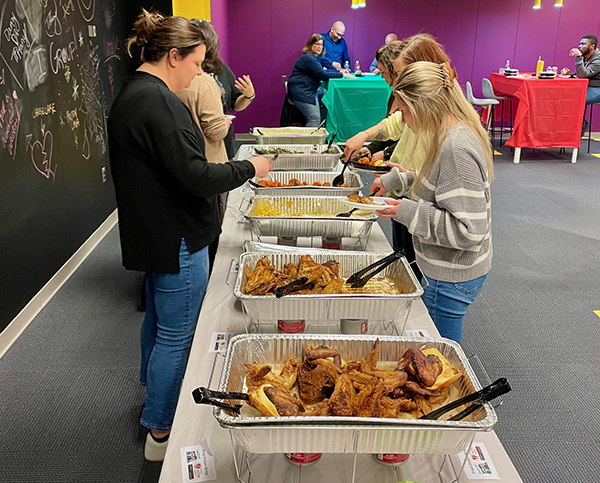
Staffers had high praises for the delicious dishes.
“When colleagues get a chance to come together, take a break and enjoy good food, good things happen,” said Dawn Shurmaitis, ASI’s executive director of corporate communications.
Kat Keesal, director of product design, was drawn to the event by the promise of mouth-watering soul food. For sure she wasn’t disappointed on that account. Still, she said there was an added, unexpected bonus: Being moved by the life story of Holmes, who shared about her accident and about her tireless work keeping Soul D’Lysh running during the challenges of the COVID-19 pandemic, all while being a full-time mom to her two young boys.
“Her story,” said Keesal, “is very impressive.”
Joe Haley interviewed Allysha Holmes about her entrepreneurial journey.
And it’s a story that’s far from finished.
Holmes had a brick-and-mortar location in Quakertown, but plans to set that aside to focus on on-site food truck/catering events. That’s where her passion lies: serving people amid the energy of a large event, feeling the vibes that come when folks go wild for her fusion dishes like Caribbean Jerk Chicken Alfredo.
As Holmes discussed this the day of the event, a guest said to a colleague nearby, “It smells amazing in here.”
Holmes smiled.
“That’s why I do this – that’s why I like being here in the moment,” she said. “Everything I cook, I cook with love.”
Reflections from a Black Entrepreneur in Promo
Seth Inyang discusses the beginnings of his company and the state of diversity in the industry.
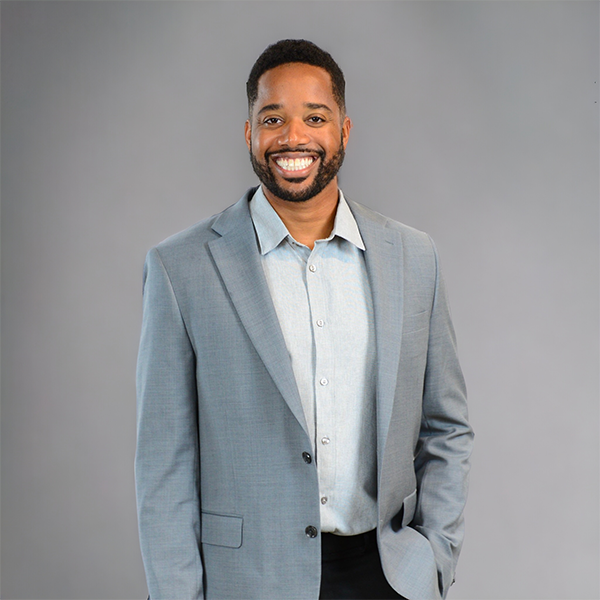
Seth Inyang,
Co-Founder of Elemental Bottles
(asi/51846) in Fountain Valley, CA
Q: What motivated you to start your business?
A: My dad moved to the U.S. from Nigeria when he was 16 with no money and eventually he was able to earn his PhD. My parents had a very strong work ethic, and that was ingrained in me. I’ve always been entrepreneurial. When I met Vinh Lieu [co-founder of Elemental Bottles] after moving to California, we established a maker studio where people could come in and use equipment to make different things. Companies started asking us to make items for them, like water bottles. We realized it was sustainable, it decreased plastic waste, and both Vinh and I are familiar with scarcity of water in the countries we’re from (Vietnam and Nigeria). We wanted to help fund charities to build wells and offer access to clean water. So we launched Elemental Bottles in 2016.
Q: What do you enjoy most about the promo industry?
A: Vinh and I thought we would just sell on Etsy. We didn’t know anything about promo. In 2017, we stumbled upon it and realized this is a multi-billion industry; we wanted to see if we could make an impact. I like that we’re involved in a lot of different industries and brands thanks to our distributors. We’re building a premium drinkware line that people want to hold onto and not throw away. We help elevate the brand we’re working with, and they help elevate us – it’s a co-brand.
Q: What challenges have you faced as a Black business owner?
A: You look different from those around you, you think there are opportunities that others are getting that you’re not. It does make you work harder. I was part of the National Society of Black Engineers (NSBE) in college and someone said, “I feel like I’m going to have to work twice as hard as someone else to get the same job.” I was prepared to do that. I didn’t think of that in a positive or negative way – life isn’t fair for anyone, and while the promo industry has become more inclusive, some things were internalized along the way.
There’s also added pressure as an immigrant to do well – there’s a drive to do something great because my parents sacrificed and worked really hard to give me opportunities and I didn’t want to squander that.
Q: What does the future look like for Black-owned suppliers and distributors in the industry?
A: It’s important as a business to be more diverse – your clientele doesn’t all look the same anymore. You have to cater to everyone, so it’s smart marketing and smart business to have minorities on your team.
Q: How can the industry attract more minority owners to the industry?
A: There has to be more awareness of the industry. There’s so much content on YouTube – leverage that. People learn so much there; there are no limitations. It shouldn’t be just trying to fill seats and meet a quota. You’re grasping at straws if people don’t even know what promo is. We also have to offer mentorship opportunities – it can’t just be employees out here looking for people. We should have mentorship programs to raise awareness and skill sets, and that’s a way to build community. But at the end of the day, it’s about loving. We’re all the same people.

